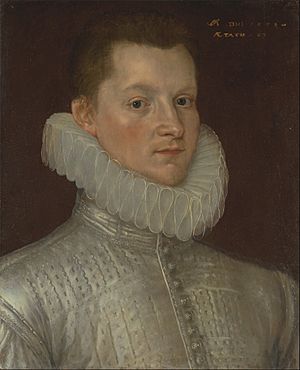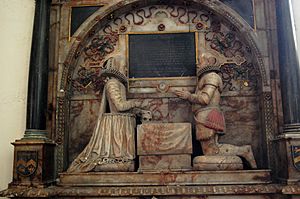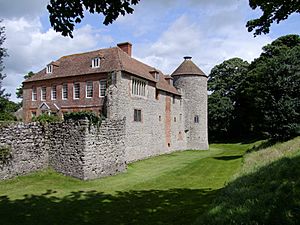John Smith (High Sheriff of Kent) facts for kids
Quick facts for kids
John Smith
|
|
|---|---|
 |
|
| Justice of the Peace | |
| In office 1587–1608 |
|
| High Sheriff of Kent | |
| In office 1600–1601 |
|
| Member of the British Parliament for Aylesbury |
|
| In office 1584 |
|
| Member of the British Parliament for Hythe |
|
| In office 1586, 1587, and 1604 |
|
| Personal details | |
| Born | 1557 |
| Died | 29 October 1608 |
| Spouse | Elizabeth Fyneux |
| Children | 8 |
| Parent |
|
Sir John Smith (or Smythe) was an important English politician who lived from 1557 to 1608. He was a Justice of the Peace (JP) and a Member of Parliament. John Smith came from Westenhanger, a place in Kent, England. He played a role in local government and in the national Parliament during his lifetime.
Early Life and Family
John Smith was the oldest son of Thomas Smythe. His father was a successful businessman in London. Thomas Smythe sold small items like needles and ribbons. He also collected taxes on goods coming into the country.
John's father bought a large estate called Westenhanger Castle. This castle became the family home. John also had a famous brother, Thomas Smythe. This brother later became the first leader of the East India Company.
In 1577, John Smith began studying law. He attended a famous law school called Gray's Inn. After his father passed away in 1591, John inherited Westenhanger Castle. He was honored with a knighthood on May 11, 1603. This meant he was given the title "Sir."
Political Career and Public Service

Sir John Smith was very active in public service. From 1587 until his death, he served as a Justice of the Peace for Kent. A Justice of the Peace was a local official. They helped keep law and order in their area.
He also held the important position of High Sheriff of Kent from 1600 to 1601. The High Sheriff was the chief law enforcement officer in the county. They were responsible for maintaining peace and carrying out legal orders.
Sir John was elected to the Parliament of England several times. A Member of Parliament (MP) represents their local area in the government. He represented Aylesbury in 1584. Later, he represented Hythe in 1586, 1587, and 1604.
From 1605 until his death, he was also the Deputy Governor of the Mines Royal. This role involved overseeing the country's important mining operations.
Later Life and Legacy
Sir John Smith passed away in 1608. He was buried in Ashford, a town in Kent. He had married Elizabeth Fyneux. She was the daughter and only heir of John Fyneux of Herne, Kent.
Together, Sir John and Elizabeth had eight children. They had two sons and six daughters. One of their sons died before his father. Their surviving son, Thomas, later became a very important person. In 1635, he was given the title Viscount Strangford. This meant he became an Irish peer.
Sir John Smith's life shows how important people like him were. They helped shape local government and national politics in England during the late 1500s and early 1600s.
 | Tommie Smith |
 | Simone Manuel |
 | Shani Davis |
 | Simone Biles |
 | Alice Coachman |


